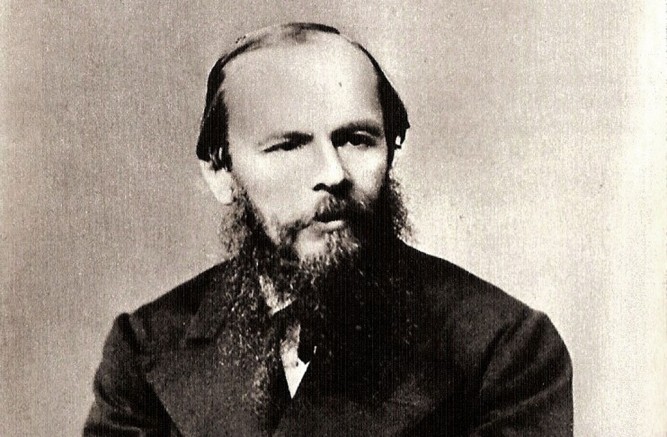November 11, 1821- February 9, 1881
Fyodor Dostoyevsky was a brilliant writer and philosopher who expanded many theories which tremendously affected Russian society. He was born in Moscow, Russia, but would later move to Saint Petersburg in 1837. The time period where he was starting to become famous was near the end of the Age of the Enlightenment and in the middle of the Industrial Revolution. Alexander I, who was Emperor of Russia, passed away, as Nicholas I was next in line, while the army officers failed to abolish serfdom and have constitutionalism. ( A timeline of Russia,) Russia were involved in many wars/battles during Fyodor’s lifetime including: their second war against Persia over Georgia, defeated Egypt at the battle of Navarino, along with Britain and France, attacked/defeated the Ottomans, and helped Austria defeat a nationalist revolt in Hungary.( A timeline of Russia,) The Russian troops also defeated the Romanian revolution, Russia, and the Ottoman empire start the Crimean war, and lastly, Russia ending up defeating the Ottomans once again. (A timeline of Russia,) This all happened in a span from 1826-1878. Other important things happening in this time period were: Russia signing treaties of alliance with Austria and Prussia in 1833 and Alexander II eventually abolishing serfdom, and allowing freedom to 20 million serfs, and land for some of them as well in 1861. Fyodor was living in the era of the landowners and the serfs, multiple years before communism, as Russia unconstrained the serfs severely in 1861.(A timeline of Russia,)
The themes in Fyodor’s four novels, Crime and Punishment, The Idiot, The Possessed, and The Brothers Karamazov, reflected what was happening in Russian society. Themes such as nihilism, existentialism, alienation, a human suffering from humour, and psychology. In Notes from the Underground, Dostoyevsky was talking about the issue of undereducated workers and peasants having such limited power and freedom during his time in jail in Siberia. He said that theorists of the 1860’s were to used to European culture, and were too disconnected from their Russian values. He says that we need to go back to follow the primary Russian values such as personal responsibility, brotherly love, family, and religion. In the book, money was also seen as a symbol of power. (“Notes from Underground.” SparkNotes, SparkNotes,) Due to the Underground Man being poor, he could never be social or equal to others throughout the novel. He wasn’t seen as a peasant, but is still ashamed as he still borrows money on a daily basis from anyone he can.(“Notes from Underground.” SparkNotes, SparkNotes,)
In Crime and Punishment, The Possessed, and the Brothers Karamazov, Fyodor explains in his book the sudden change from being a socialist to a nihilist, right after he got out of jail in Siberia. A nihilist is a person who believes that life is meaningless and doesn’t believe in any religion. During the time Fyodor was alive, more and more people believed in nihilism, as was reflected in Crime and Punishment. (“Crime and Punishment.” SparkNotes, SparkNotes,) He uses the main character Raskolnikov as a socialist, which was the “old Dostoevsky” and used another character named Lebeziatnikov as a nihilist, who wanted to use “new philosophies”. He also talked about how indigent most of the characters in the book, including the main character’s family, the Raskolnikov’s, as he approached his sister about marrying a man just because of his wealth. Dostoyevsky’s description of poverty authorizes him to talk about social issues to make situations, to which the only way to stay alive is through self-sacrifice.(“Crime and Punishment.” SparkNotes, SparkNotes,)
Fyodor had a huge impact on Russian society, scholars, and philosophers, who came after he had died. He has been acknowledged all over the world as one of the greatest writers and philosophers for multiple years now. His last book, The Brothers Karamazov, was said to be the masterpiece of Western literature. He also influenced Friedrich Nietzsche and Leo Tolstoy. The most crucial years of Dostoevsky’s life were also the most active, as Russian history was changing so much. He became involved in political interests of controversial topics. Fyodor was lastly influenced by radical ideas entering Russia from the West. (“The Brothers Karamazov.” Fyodor Dostoevsky Biography, )
Tobi Osisanya
Works Cited: Bibliography
“Diagnosing Literary Genius.” Google Books,
Roberts, Peter. “EDUCATION AND THE LIMITS OF REASON: READING DOSTOEVSKY.” Educational Theory, Blackwell Publishing Ltd, 15 Apr. 2012,
“Handbook of Social Capital.” Google Books,
“Dostoevsky’s Polyphonic Talent.” Google Books, “Introduction: Faith-Based Organisations and Urban Social Issues.” Introduction: Faith-Based Organisations and Urban Social IssuesUrban Studies – Justin Beaumont, 2008,
Other Relevant Readings
A timeline of Russia
“Existentialism.” AllAboutPhilosophy.org,
Rbth. “All you ever wanted to know about Dostoevsky.” Russia Beyond, 11 Nov. 2013,
Morson, Gary Saul. “Fyodor Dostoyevsky.” Encyclopædia Britannica, Encyclopædia Britannica, inc., 27 Apr. 2017,
